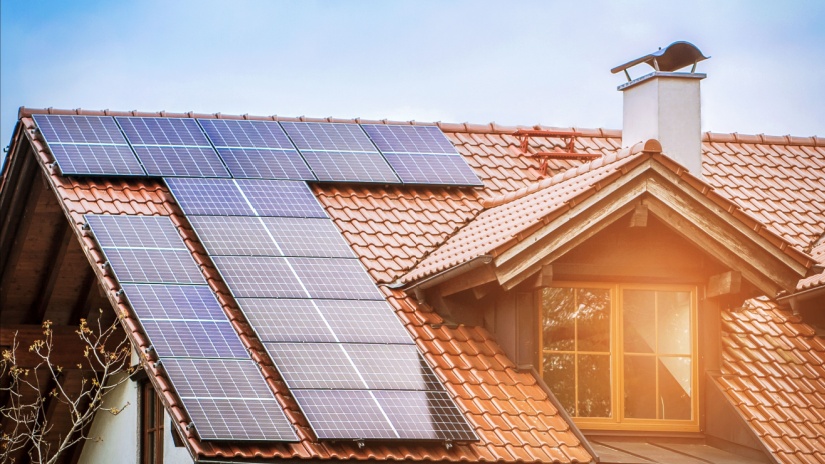Knowledge Centre
Solar batteries: What types can you get?

Choosing the right solar battery for your home’s solar power system is essential, but it can be overwhelming with so many options available. Understanding the different types of solar batteries and their unique features is key to making an informed decision that meets your energy needs.
In this article, we’ll break down the different types of solar batteries, their benefits, and how they work, helping you find the right energy storage solution for your home. Whether you’re looking to store more energy, improve efficiency, or reduce costs, understanding your options is the first step.
Types of solar batteries
Solar batteries come in four main types: lead-acid, lithium-ion, nickel cadmium, and flow batteries. Among these, lithium-ion batteries are the most commonly used in residential solar systems. They can be AC-coupled, ideal for retrofitting existing systems, or DC-coupled, which are better suited for new installations alongside solar panels.
Lead-acid batteries
Lead-acid batteries are a well-established option in the solar battery industry, known for their longstanding presence and dependability.
Having been around since the 19th century, these deep-cycle batteries have a proven track record of effectively storing energy. Their longevity in the market is a testament to their consistent performance and reliability.
Lead-acid batteries come in two primary varieties: flooded lead-acid batteries and sealed lead-acid batteries.
| Pros | Cons |
| Affordable upfront costs | Requires consistent maintenance |
| Accessible from a range of solar providers | Lower energy capacity |
| Withstands harsh temperatures | Not great for large homes |
Ideal for: The dependable nature of lead-acid batteries makes them well-suited for off-grid solar setups or as a backup power source during outages.
Lithium-ion batteries
Lithium-ion batteries are a relatively new addition to the energy storage landscape. In Australia, they’ve quickly become the most popular choice for residential solar systems. These batteries are lightweight, require minimal maintenance, and boast an impressive lifespan of up to 15 years.
Known for their high efficiency, lithium-ion batteries also charge and discharge more quickly than lead-acid batteries. Although they come with a higher price tag, their costs are steadily decreasing.
As electric vehicles gained traction, manufacturers recognised the potential of lithium-ion technology for energy storage, leading to its widespread adoption in solar battery systems.
| Pros | Cons |
| Efficient and durable | Higher costs upfront |
| Minimal maintenance required | Sensitive to extreme temperatures |
| High energy density | Technology is rapidly evolving |
Ideal for: Lithium-ion batteries are particularly well-suited for residential solar setups due to their ability to store a substantial amount of energy in a compact size. They also enable efficient use of the stored energy, making them an excellent choice for powering a home.
Nickel-cadmium batteries
Nickel-cadmium batteries (Ni-Cd) are less common compared to lead-acid or lithium-ion batteries. Introduced in the late 1800s, Ni-Cd batteries saw significant advancements in the 1980s, which enhanced their energy storage capacity.
They are particularly valued in the aviation sector. Similarly, sodium nickel chloride batteries, which use salt and nickel to produce energy, are a relatively new technology in Australia. These batteries are becoming increasingly popular due to their high-power density and average lifespan of around 15 years.
| Pros | Cons |
| Higher energy density compared to lead-acid batteries | Very high upfront costs |
| Won't overheat or catch fire - performs well in various temperatures | Less efficient compared to other battery types |
| Low maintenance | Not as widely available in Australia yet |
Ideal for: Ni-Cd batteries are favoured for large-scale applications such as utility solar energy storage due to their robust durability.
Flow batteries
Flow batteries represent a developing technology in the field of energy storage. Unlike traditional batteries, flow batteries use two distinct electrolytes separated by a membrane to store electricity. These batteries use liquid electrolytes and typically offer a lifespan ranging from five to 15 years.
The design includes a water-based electrolyte that circulates between two separate tanks within the battery. During charging, chemical reactions facilitate energy storage, which can then be discharged when needed.
Although their popularity is growing, flow batteries are currently less suitable for residential applications due to their larger size and higher cost compared to other battery types.
| Pros | Cons |
| Can be fully discharged in a cycle, without affecting its lifespan | Requires regular maintenance |
| Withstands extreme temperatures and weather conditions | Much heavier and bigger than other battery types |
| Operates at low voltages, suitable for larger homes and commercial buildings | Not widely offered |
Ideal for: Flow batteries are most suitable for large-scale installations.
Which battery is best for solar?
What’s the best battery type for solar systems? Selecting the right battery can greatly impact your solar energy setup. The answer isn't always clear-cut, but for most residential and small business solar installations, lithium-ion batteries are generally the top choice.
These batteries provide a longer lifespan, higher efficiency, and can endure more charge and discharge cycles compared to other types. They also need less maintenance than traditional lead-acid batteries, offering more convenience for solar users.
Ultimately, the ideal battery for your solar system will depend on your specific requirements and setup.
Choosing the right battery for your home
For most home solar systems, lithium-ion batteries are usually the best choice. They can store a lot of energy in a compact size, efficiently use most of their stored power, and are widely available. Many solar companies can install lithium-ion batteries correctly and safely due to their popularity.
If you're on a budget, lead-acid batteries might be a good alternative. They’ve been around for a long time and are more affordable.
While Ni-Cd and flow batteries are also options, lithium-ion and lead-acid are typically preferred for solar systems. To find the best battery for your needs, it's a good idea to consult with local solar installers.
Things to consider before buying solar batteries
Here’s a list of important factors to consider before purchasing a solar battery:
- Battery type: Determine which type of battery—lithium-ion, lead-acid, Ni-Cd, or flow—best suits your needs based on lifespan, efficiency, and cost.
- Energy storage capacity: Assess how much energy you need to store based on your household or business’s energy usage and the size of your solar system.
- Power output: Consider the battery’s power output capacity to ensure it can meet your energy demands during peak usage times.
- Lifespan: Evaluate the expected lifespan of the battery and how many charge-discharge cycles it can handle before its performance declines.
- Efficiency: Check the battery’s efficiency ratings to understand how effectively it converts and stores energy.
- Cost: Compare the upfront costs of different batteries and weigh them against their benefits and long-term savings.
- Warranty: Review the warranty offered for the battery to ensure it provides adequate coverage for potential issues or failures.
- Installation requirements: Consider the complexity of installation and whether you need specialised technicians or if the battery is compatible with your existing solar system.
- Maintenance: Look into the maintenance needs of the battery and whether it requires regular upkeep or monitoring.
- Size and space: Ensure the physical size of the battery fits within your available installation space and matches your setup requirements.
- Temperature tolerance: Assess the battery’s performance in various temperature conditions to ensure it will function effectively in your local climate.
- Brand reputation and reviews: Research the manufacturer’s reputation and read reviews from other users to gauge reliability and customer satisfaction.
- Compatibility with your solar system: Ensure the battery is compatible with your solar panel system and inverter for seamless integration and performance.
- Local regulations and incentives: Check for any local regulations or incentives related to solar battery installation that might affect your decision.
Is investing in battery storage worth it?
In most cases, the answer is yes, but the decision hinges on several personal factors. A solar battery, or multiple batteries, can be one of your largest investments after your home and car, making it crucial to consult with a professional before making a commitment.
As the demand for renewable energy grows, it's important to understand the various battery options available to Australian homeowners. Among the most popular are lead-acid, lithium-ion, flow, and sodium nickel chloride batteries.
Each type has its advantages and disadvantages, so evaluating your specific needs is essential to finding the best fit for your solar energy system. Selecting the right battery can lead to reliable power, reduced energy costs, and a positive impact on the environment.
Contact Compare Energy
Looking at going solar now that you’re feeling more confident that you understand the types of solar battery you need?
The best thing that you can do to compare solar plans is to contact the team at Compare Energy on 1300 790 106. We’ll walk you through the options available via our provider and get you set up.

